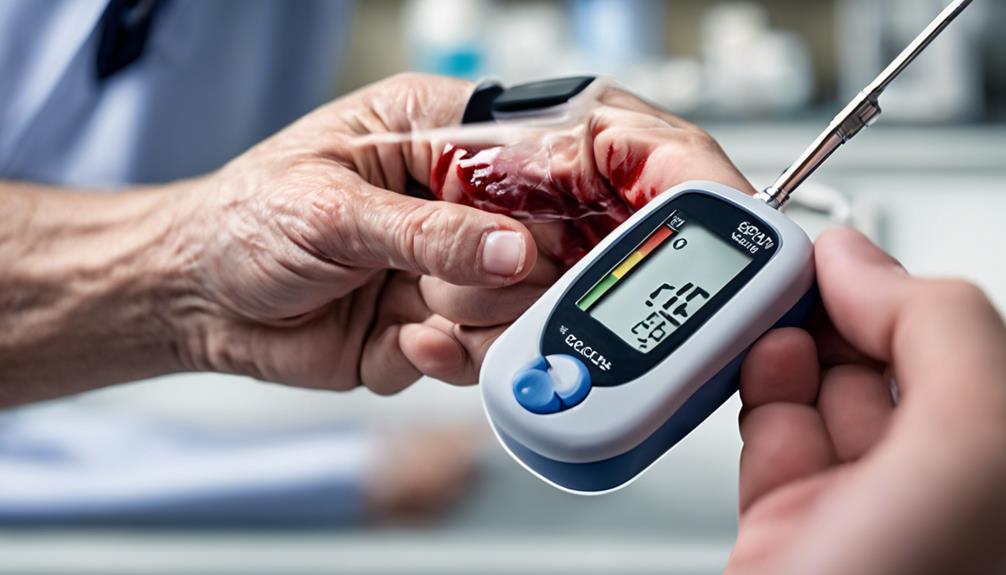In the Southeastern region, around 10.9% of adults are impacted by diabetes, which is a major health concern in the area. It is essential for both individuals and healthcare providers to comprehend the implications of this long-term condition.
As we explore the prevalence of diabetes in the Southeast, it becomes evident that proactive management and access to quality care are essential components in addressing this growing health concern.
Join us as we delve into the strategies, resources, and support systems available to navigate the complexities of diabetes management in the Southeast.
Key Takeaways
- Southeast Diabetes specializes in Type 1 and gestational diabetes support.
- Community-based diabetes education initiatives are crucial for promoting awareness.
- Collaboration with nurses and dietitians for personalized diabetes management advice.
- Virtual support group sessions offer tailored diabetes support and education.
Impact of Diabetes in the Southeast
In the Southeast region of the United States, diabetes exerts a significant and complex impact, driven by a combination of lifestyle factors, healthcare disparities, genetic influences, and disparities among minority populations. The American Diabetes Association recognizes the urgent need for targeted interventions in this region to address the high prevalence of Type 2 diabetes. Healthy eating habits play a crucial role in managing diabetes, and educational programs focused on nutrition are vital.
Minority populations, such as African Americans and Hispanics, are disproportionately affected by diabetes in the Southeast due to various socio-economic factors. Lack of access to quality healthcare services further exacerbates the situation, leading to higher rates of unmanaged diabetes. Community-based diabetes education initiatives are essential in promoting awareness about the disease and empowering individuals to make informed decisions about their health.
To combat the impact of diabetes effectively in the Southeast, a multi-faceted approach that includes increasing access to healthcare, culturally tailored diabetes education, and promoting healthy lifestyle choices is paramount. The collaboration between healthcare providers, community organizations, and policymakers is crucial in addressing the complex challenges posed by diabetes in this region.
Managing Blood Sugar Levels

Managing blood sugar levels effectively is paramount for individuals with diabetes to prevent complications and maintain overall health. Monitoring blood sugar levels is crucial for managing diabetes and avoiding complications. By following a healthy diet, exercising regularly, and taking prescribed medications, individuals can better manage their blood sugar levels. Consistently monitoring blood sugar levels helps individuals understand how different factors such as food, physical activity, and stress impact their levels. This understanding is key to maintaining overall health and reducing the risk of long-term complications associated with diabetes.
| Strategies for Managing Blood Sugar Levels | Benefits |
|---|---|
| Follow a healthy diet | Helps regulate blood sugar levels and overall health |
| Exercise regularly | Improves insulin sensitivity and aids in blood sugar control |
| Take prescribed medications | Helps manage blood sugar levels effectively and reduce complications |
Healthcare Options for Diabetes
Healthcare options for diabetes encompass a range of specialized services and resources tailored to support individuals in effectively managing their condition and improving their quality of life. At Southeast Diabetes and Mercy in Cape Girardeau, individuals can access a variety of healthcare options such as:
- Insulin Pump Supplies and CGM Materials: Southeast Diabetes provides essential supplies for individuals requiring insulin pumps and continuous glucose monitoring (CGM) devices.
- Diabetes Education and Counseling: Mercy in Cape Girardeau offers diabetes education, counseling, and self-management classes to empower individuals with the knowledge and skills needed to manage their diabetes effectively.
- Specialized Support for Type 1 and Gestational Diabetes: Southeast Diabetes focuses on supporting individuals with type 1 diabetes and gestational diabetes, providing specialized care tailored to their unique needs.
- Collaboration with Nurses and Dietitians: Individuals can make an appointment with nurses and dietitians at Mercy's Diabetes Education Center to receive personalized advice on managing their diabetes through medical nutrition therapy and lifestyle modifications.
Tips for Diabetes Management

Exploring effective strategies for diabetes management involves a comprehensive approach that encompasses controlling blood glucose levels, adopting healthy eating habits, staying physically active, understanding diabetes types and treatments, and recognizing the importance of blood glucose control. Different types of diabetes, such as type 1, type 2, and gestational diabetes, require tailored management approaches.
Educating oneself about the risk factors associated with diabetes is crucial to implement preventive measures effectively. Help people understand the Standards for Diabetes Self-Management, which emphasize the significance of regular blood glucose monitoring, healthy eating, physical activity, medication adherence, and stress management. By following these standards, individuals can proactively manage their diabetes and reduce the risk of complications.
It's essential to consult healthcare providers for personalized guidance and support in developing a diabetes management plan that suits individual needs and lifestyle. Remember, proactive management is key to living well with diabetes.
Support Resources for Individuals
Southeast Diabetes offers a virtual support group every other month via Zoom for individuals seeking personalized assistance in managing their diabetes. This program, recognized by the American Diabetes Association, aims to meet the National standards for diabetes care. The support group is staffed by specialized nurses and dietitians who provide tailored support to help individuals better manage their condition.
Here are some key aspects of the support group sessions:
- Expert Staff: Nurses and dietitians specializing in diabetes management lead the sessions, ensuring participants receive accurate and up-to-date information.
- Comprehensive Support: Participants have access to information on diabetes diet, exercise tips, medication overviews, and strategies for managing blood glucose levels effectively.
- Interactive Sessions: The virtual support group allows for interactive discussions, enabling individuals to ask questions and engage with the experts.
- Registration Process: Interested individuals, including those who are newly diagnosed, can find registration information on the Southeast Diabetes website and must complete a form download to attend the sessions.
Frequently Asked Questions
What Is the Most Common Type of Diabetes?
The most common type of diabetes is Type 2 diabetes, accounting for about 90-95% of all diabetes cases in adults. It's characterized by insulin resistance, where the body's cells don't respond effectively to insulin.
Risk factors for Type 2 diabetes include obesity, sedentary lifestyle, family history, and age over 45. Type 2 diabetes can often be managed through lifestyle changes, medication, and monitoring blood sugar levels.
It's crucial to work closely with healthcare providers to create a personalized treatment plan.
What Is the Difference Between Type 1 and Type 2 Diabetes?
Type 1 diabetes results from the immune system attacking insulin-producing cells, causing insulin deficiency. In contrast, type 2 diabetes is marked by insulin resistance, where cells don't respond effectively to insulin, leading to high blood sugar levels.
Type 1 often occurs in young individuals, requiring lifelong insulin therapy. Type 2, more common in adults, can often be managed with lifestyle changes, medications, and sometimes insulin.
What Causes Diabetes Mellitus?
Diabetes mellitus arises from the body's failure to produce sufficient insulin or effectively use the produced insulin. Type 1 diabetes stems from an autoimmune reaction attacking pancreatic beta cells.
In type 2 diabetes, factors like genetics, lifestyle, and obesity contribute to insulin resistance. Gestational diabetes emerges during pregnancy due to hormonal fluctuations affecting insulin.
Other causes include pancreatic disorders, certain medications, and rare genetic conditions affecting insulin production or action.
How Can Diabetes Be Treated?
Diabetes can be managed through lifestyle changes like healthy eating, exercise, and weight control. Medications such as insulin and metformin are commonly used. Regular monitoring of blood sugar levels is essential to adjust treatment.
In severe cases, bariatric surgery may be an option for those with uncontrolled type 2 diabetes. It's important to work closely with healthcare providers to determine the best treatment plan for individual needs.
Conclusion
In conclusion, managing diabetes requires diligence and commitment. By staying proactive and utilizing available resources, individuals can effectively keep their blood sugar levels in check and improve their overall health.
As the saying goes, 'an ounce of prevention is worth a pound of cure.' It's essential to prioritize diabetes management to prevent complications and lead a healthier life.
Take control of your diabetes journey and make positive choices for better health.









